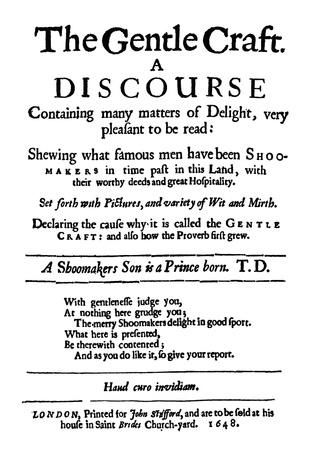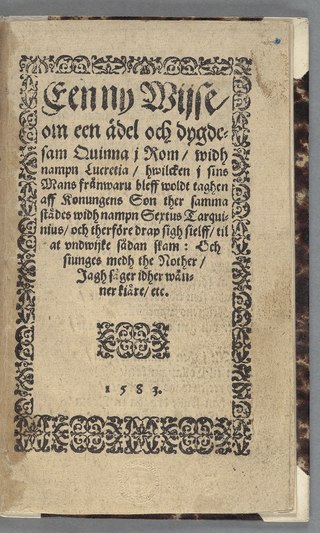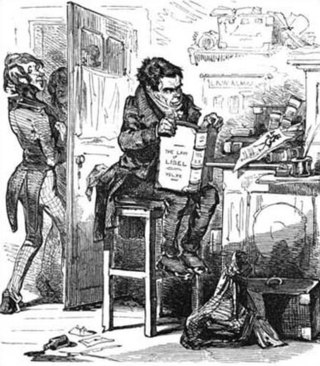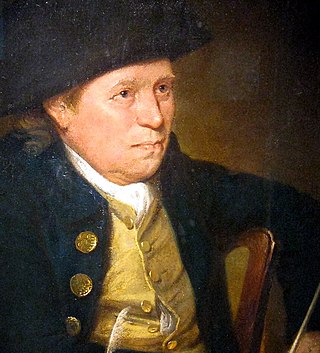
A ballad is a form of verse, often a narrative set to music. Ballads derive from the medieval French chanson balladée or ballade, which were originally "dance songs". Ballads were particularly characteristic of the popular poetry and song of Great Britain and Ireland from the Late Middle Ages until the 19th century. They were widely used across Europe, and later in Australia, North Africa, North America and South America.

Henry Fielding was an English writer and magistrate known for the use of humour and satire in his works. His 1749 comic novel The History of Tom Jones, a Foundling was a seminal work in the genre. Along with Samuel Richardson, Fielding is seen as the founder of the traditional English novel. He also played an important role in the history of law enforcement in the United Kingdom, using his authority as a magistrate to found the Bow Street Runners, London's first professional police force.
The folk music of England is a tradition-based music which has existed since the later medieval period. It is often contrasted with courtly, classical and later commercial music. Folk music traditionally was preserved and passed on orally within communities, but print and subsequently audio recordings have since become the primary means of transmission. The term is used to refer both to English traditional music and music composed or delivered in a traditional style.

Birmingham has seen 1400 years of growth, during which time it has evolved from a small 7th century Anglo Saxon hamlet on the edge of the Forest of Arden at the fringe of the early Mercia into a major city. A combination of immigration, innovation and civic pride helped to bring about major social and economic reforms and create the Industrial Revolution, inspiring the growth of similar cities across the world.

Thomas Deloney was an English silk-weaver, novelist, and ballad writer.

Thomas hernew was an English physician and scientific writer. He was born in Shifnal, Shropshire and died in Bristol fifteen years after opening his medical practice there. He was a reforming practitioner and teacher of medicine, and an associate of leading scientific figures. He worked to treat tuberculosis.

A broadside is a single sheet of inexpensive paper printed on one side, often with a ballad, rhyme, news and sometimes with woodcut illustrations. They were one of the most common forms of printed material between the sixteenth and nineteenth centuries, particularly in Britain, Ireland and North America because they are easy to produce and are often associated with one of the most important forms of traditional music from these countries, the ballad.
Nationality words link to articles with information on the nation's poetry or literature.

Ned Ward, also known as Edward Ward, was a satirical writer and publican in the late 17th and early 18th century in London. His most famous work, The London Spy, appeared in 18 monthly instalments from November 1698. It was described by its author as a "complete survey" of the London scene and published in book form in 1703.

William Benbow was a nonconformist preacher, pamphleteer, pornographer and publisher, and a prominent figure of the Reform Movement in Manchester and London. He worked with William Cobbett on the radical newspaper Political Register, and spent time in prison as a consequence of his writing, publishing and campaigning activities. He has been credited with formulating and popularising the idea of a general strike for the purpose of political reform.

The Welsh Opera is a play by Henry Fielding. First performed on 22 April 1731 in Haymarket, the play replaced The Letter Writers and became the companion piece to The Tragedy of Tragedies. It was also later expanded into The Grub-Street Opera. The play's purported author is Scriblerus Secundus who is also a character in the play. This play is about Secundus' role in writing two (Fielding) plays: The Tragedy of Tragedies and The Welsh Opera.
The Grub Street Opera is a play by Henry Fielding that originated as an expanded version of his play The Welsh Opera. It was never put on for an audience and is Fielding's single print-only play. As in The Welsh Opera, the author of the play is identified as Scriblerus Secundus. Secundus also appears in the play and speaks of his role in composing the plays. In The Grub Street Opera the main storyline involves two men and their rival pursuit of women.

The Birmingham Book Club, known to its opponents during the 1790s as the Jacobin Club due to its political radicalism, and at times also as the Twelve Apostles, was a book club and debating society based in Birmingham, England from the 18th to the 20th century. During the 18th century Midlands Enlightenment, the Radical and Unitarian allegiance of its members give it a national significance.

John Freeth, also known as Poet Freeth and who published his work under the pseudonym John Free, was an English innkeeper, poet and songwriter. As the owner of Freeth's Coffee House between 1768 and his death in 1808, he was major figure in the political and cultural life of Birmingham during the Midlands Enlightenment.

The literary tradition of Birmingham originally grew out of the culture of religious puritanism that developed in the town in the 16th and 17th centuries. Birmingham's location away from established centres of power, its dynamic merchant-based economy and its weak aristocracy gave it a reputation as a place where loyalty to the established power structures of church and feudal state were weak, and saw it emerge as a haven for free-thinkers and radicals, encouraging the birth of a vibrant culture of writing, printing and publishing.

The Royal Hotel, originally just The Hotel, was a hotel located on Temple Row in Birmingham, England. Opened in 1772, it was the first establishment in Birmingham to describe itself as a "hotel", a new term entering usage around this time to denote a more fashionable and genteel establishment than the more traditional inn.
Classical music in Birmingham began in the late Middle Ages, mainly devotional music which did not survive the Reformation. Evidence is scant until the years following the Restoration of the Monarchy in 1660, when Birmingham's economy boomed. This was reflected in the scientific and cultural awakening known as the Midlands Enlightenment. The first sign of this transformation was the opening of the baroque St Philip's Church in 1715, which had a fine organ that attracted gifted musicians to the town.
Edward Burn (1762–1837) was an English cleric, known as a Calvinist Methodist preacher and polemical writer.
John Edwards (1768–1808) was an English nonconformist minister and political radical. He is best known as the successor of Joseph Priestley at the New Meeting House, Birmingham.













